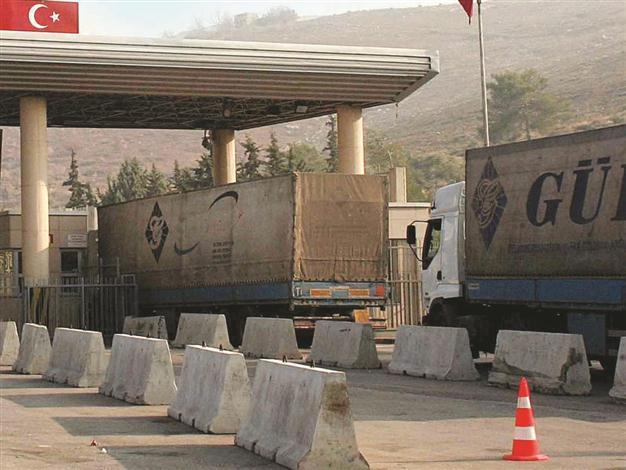Turkey raises Syrian tariff, eyes new routes
ISTANBUL - Anatolia News Agency

Turkish and Syrian trucks start to enter each others’ soil after a five-day pause. AA photo
Turkey will begin demanding a 30 percent tax on goods from Syria and will no longer permit any vehicles older than 20 years in from the Arab republic, Customs and Trade Minister Hayati Yazıcı said yesterday.The news came after Syria began allowing Turkish trucks to pass through its borders yesterday after a six-day halt due to problems between the two countries over Syria’s measures against anti-government opposition forces.
Turkey has said it will start transporting goods to Middle Eastern and Gulf countries through three alternative routes that would bypass its neighbor.
“As a strong country trading with more than 239 customs zones, Turkey is not obliged to pass through Syria to trade with Middle Eastern and Gulf countries,” Zafer Çağlayan, Turkey’s economy minister, told a retailers’ summit in Istanbul yesterday.
“We have all our plans ready on the table,” said the minister, naming three alternative routes to reach Jordan – one through Alexandria in Egypt, one through Beirut in Lebanon and one through neighboring Iraq.
He also said the option of trading with the region through the Suez Canal might also be on the agenda if necessary in the future.
Turkish trucks started passing through Syrian border gates yesterday, according to Syria’s International Transportation Association (UND).
Still, Turkish trucks pay high taxes and tariffs, according to Mustafa Yılmaz, a UND board member.
Syria has doubled the tax on transit to Lebanon from Turkey, while also starting to implement taxes on mutual transportation after the Turkish Foreign Minister Ahmet Davutoğlu announced nine sanctions on its neighbor last week. The Syrian tariffs, which were set at 30 percent, were 0 percent before Turkey leveled the sanctions against Damascus.
The tax on fuel prices was also increased to 80 Syrian Liras from 30 liras, said Yılmaz.
The measures add $800 to transport costs to Syria per truck, Yılmaz said, adding that the price has risen by $1,400 for goods heading to Lebanon.
Unlike the economy minister, “Turkish exporters have no choices other than using the Syrian route for transport to the region,” Yılmaz said.
“We wanted the Syrian economy to make a profit through the transit trade from Turkey to the region, and the Syrian government wanted trade to continue,” the economy minister said. “I repeat this all the time regarding Syria, what goes around comes around.”
Turkey has always had alternative routes to trade with the region, he added. “If we start to take measures against Syria, the measures we would take might hurt them even more.”
Welcoming the Arab League sanctions launched recently against Syria, the minister said Syria had begun acting illogically by increasing pressure over its own businessmen.
“Turkey’s exports reached nearly $1.8 billion annually to Syria as the country’s industry had not developed much,” Çağlayan said, adding that a trade pact between Turkey and Syria remained suspended.
Damascus decided last week to suspend the 2004 trade pact after the Arab League announced a series of sanctions against the Syrian regime.
“They are punishing their own people by increasing the custom tariffs and taxes on the products exported from Turkey to the country,” he said, adding that this would result in a direct increase in prices, thereby raising the economic pressure on Syrian consumers.
















